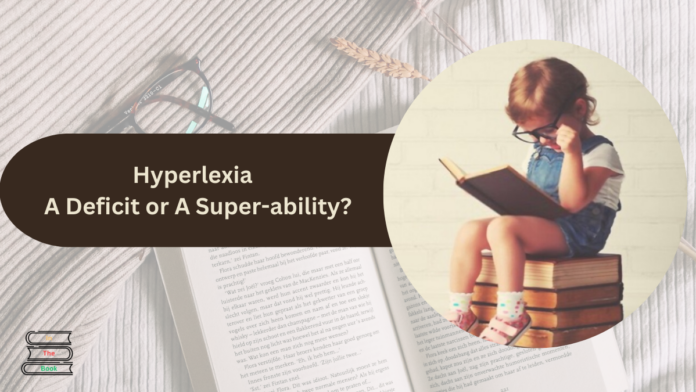Hyperlexia is a fascinating condition characterized by an early and exceptional ability to read, often accompanied by difficulties in understanding spoken language and social interactions. This condition raises the question: Is hyperlexia a deficit or a super-ability?
Understanding hyperlexia involves examining its characteristics, causes, and implications, as well as recent scientific discoveries that shed light on this intriguing phenomenon.
Contents
What is hyperlexia?
Hyperlexia is typically identified when a child demonstrates an advanced ability to read far beyond what is expected for their age, usually before the age of five. These children often have an intense fascination with letters and numbers, and they can decode written words with remarkable speed and accuracy.
However, they frequently struggle with reading comprehension and other aspects of language and communication. Hyperlexia is commonly associated with autism spectrum disorder (ASD), but it can also occur in children without ASD.
Characteristics of hyperlexia
Children with hyperlexia exhibit several notable characteristics:
- Advanced decoding skills: They can read words and often sentences with little to no formal instruction.
- Fascination with written material: They show a deep interest in books, signs, and other printed materials.
- Difficulty with comprehension: Despite their reading ability, they often have trouble understanding what they read.
- Language and social challenges: Many hyperlexic children struggle with spoken language and social interactions.
Types of hyperlexia
Researchers categorize hyperlexia into three types:
- Hyperlexia I: This occurs in neurotypical children who are simply early readers without any accompanying developmental issues. These children do not require intervention.
- Hyperlexia II: This type is associated with autism. Children exhibit hyperlexic reading abilities alongside autistic traits, such as difficulties with social communication and repetitive behaviors.
- Hyperlexia III: Children with this type exhibit hyperlexic abilities and some traits of autism but do not meet the full criteria for an autism diagnosis. Their social communication skills are often closer to typical development.
Is hyperlexia a deficit?
Hyperlexia can be seen as a deficit due to its association with other developmental challenges. Children with hyperlexia often require specialized support to improve their language comprehension and social skills.
The disparity between their decoding skills and comprehension can make it difficult for them to fully engage with the material they read. Additionally, the social and communication difficulties associated with hyperlexia can impact their ability to form relationships and navigate social situations effectively.
Is hyperlexia a super-ability?
On the other hand, hyperlexia can be viewed as a super-ability due to the extraordinary reading skills these children possess. Their ability to decode words at an early age can be an asset in educational settings, allowing them to access information and engage with learning materials in unique ways.
Some researchers suggest that hyperlexic children might have a particular cognitive profile that enables them to process written language differently, potentially leading to insights into the nature of reading and language acquisition.
Scientific discoveries and perspectives
Recent research has provided deeper insights into hyperlexia. Studies show that hyperlexia is often linked to an uneven cognitive profile, where children have specific strengths in decoding written language but significant challenges in other areas, such as language comprehension and social communication.
This understanding helps in developing targeted interventions to support these children effectively. For example, a study in “Molecular Autism” highlights that children with hyperlexia, particularly those on the autism spectrum, show an intense and precocious interest in written material.
Conclusion
Hyperlexia is a complex condition that embodies both deficits and super-abilities. While children with hyperlexia face challenges in language comprehension and social interactions, their exceptional decoding skills and fascination with written material can be harnessed as strengths.
FAQs
What is hyperlexia?
Hyperlexia is a condition where children demonstrate advanced reading skills at an early age but often struggle with reading comprehension and social communication.
Is hyperlexia always associated with autism?
Hyperlexia is commonly associated with autism spectrum disorder, but it can also occur in children without autism.
What are the main challenges faced by children with hyperlexia?
The main challenges include difficulties in reading comprehension, spoken language, and social interactions.
Can children with hyperlexia improve their comprehension skills?
Yes, with appropriate interventions and support, children with hyperlexia can improve their comprehension and social skills.
Is hyperlexia considered a learning disorder?
Hyperlexia is considered a specific learning disorder related to reading, where decoding skills are advanced but comprehension is impaired.
Read more:
- The Real Reason Invoices Go Unpaid — And How Collection Automation Can Fix It
- Best Places to Buy Diamonds and Engagement Rings Online
- Building Focus and Strategy Through Interactive Digital Experiences
- How Students’ Reading Interests Influence Their Motivation and Performance in Writing Assignments
- The Damages Resulting from the Use of Suboxone

Chandler is an avid automobile enthusiast who is passionate about all things on wheels. From the latest car models to classic vintage rides, I love exploring the automotive world’s intricate details and engineering marvels. With years of experience in test-driving, reviewing, and analyzing cars, I provide readers with comprehensive insights and honest opinions.


























